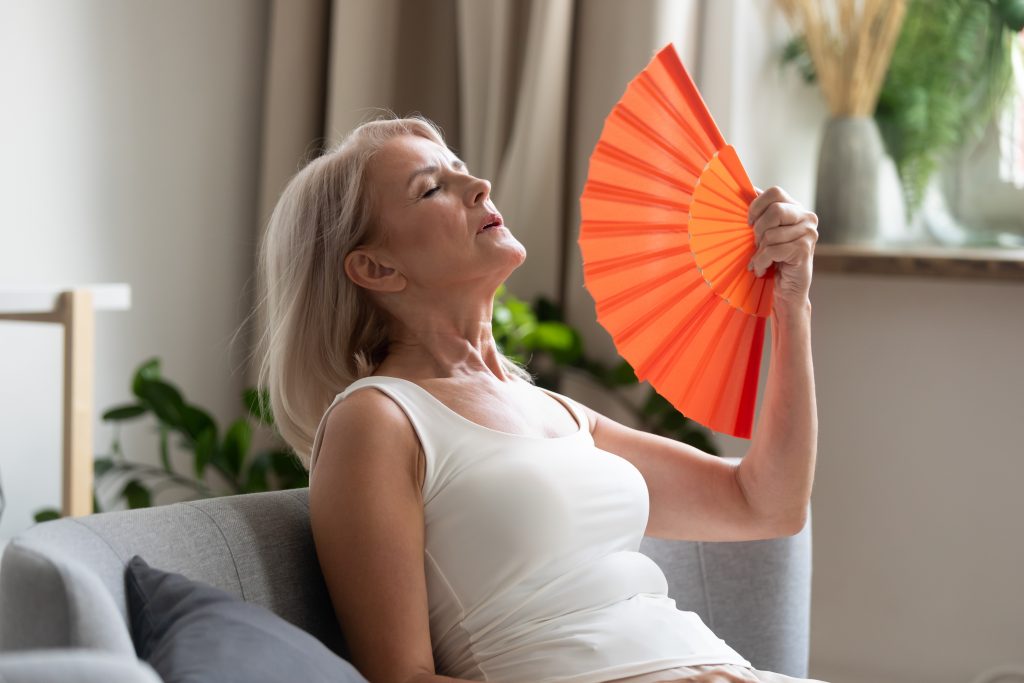Menopause occurs when menstrual periods stop permanently. At this time, women may no longer get pregnant. But, this event also comes with symptoms that may last for extended periods. Proper management and treatment for these symptoms are vital to maintaining a normal or excellent quality of life.

What Are The Symptoms Of Menopause?
Women may experience 34 various menopause symptoms. But, some symptoms tend to be more common for several women than other signs.
Some of these symptoms may include (but are not limited to) the following:
- Hot flashes
- Dry vagina
- Bladder or vaginal infections
- Sleeping difficulties
- Hair loss
- Sudden mood changes
Listen to your body and consult a doctor to see the intensity of these symptoms. Don’t consume random drugs you see on a store shelf without consulting professional advice. Otherwise, you might put yourself at a high risk of contracting adverse effects.
How Do You Treat Menopause Symptoms?
Thankfully, several treatment options are available in improving or managing menopause symptoms. Some of these treatments are:
- Vitamin D
Consider consuming more Vitamin D to help treat menopause naturally. Vitamin D deficiency may increase the risk of certain health complications, such as bone pain and osteomalacia or the softening of bones. These issues also tend to be quite common for women in their menopausal stages as estrogen levels drop.
It’s possible to acquire the recommended daily allowance (RDA) of this vitamin through direct sunlight exposure. Still, you might need extra help in reaching the RDA of vitamin D, and you can achieve this goal through supplementation.
Research indicates that women between the ages of 50 and 79 (who tend to already be in their menopausal stages) may need calcium and vitamin D supplementation to prevent bone-related issues. Moreover, women in these ages should get about 20 mcg or 800 IU of this vitamin daily to reduce specific health concerns.
Aside from the sun and store-bought supplements, you may also get more vitamin D-rich foods. Some options may include egg yolks, beef liver, fatty fish, and cheese.
- Special Shampoos
Hair loss might be more apparent during menopause than in pre-menopausal stages because of hormonal imbalance. The body’s lowered production of estrogen and progesterone may inhibit the hair from growing faster and staying on the head for more extended periods.
Thus, women experiencing hair loss because of menopause may consider seeking the help of anti-hair fall shampoos. But, it doesn’t mean you should buy just any haircare product you can find.
Don’t forget to consider some essential factors when choosing anti-hair fall shampoos. For instance, you should understand your hair type. Think about your hair’s density, diameter, elasticity, and pattern, to name a few factors. Select a shampoo that coincides with these specific characteristics to reduce complications during and after use.
Still, you may consider some essential shampoo ingredients to reduce hazards. Some of these components are:
- Activated charcoal
- Zinc
- Keratin
- Ginger
- Shea butter
- Ketoconazole
You may also consider talking to your dermatologist for professional advice in using the right anti-hair fall product.

- Exercise
Sticking to a strict workout routine can promote several benefits, especially to women suffering from menopause.
Note that hot flashes might be more apparent to overweight or obese women. It’s because the extra fat cells may contribute to extra insulation, allowing heat to stay trapped inside the body for extended periods.
Exercising helps reduce unwanted fat, allowing you to experience reduced risks of hot flashes and other symptoms. Furthermore, regularly working out may promote other health advantages, such as:
- Weight gain prevention
- Reduced risks of cancer
- Stronger bones
- Better mood
If you don’t have a regular exercise regimen yet, you might feel undecided about the right workout to pursue. Keep in mind that some exercises tend to give better benefits than others. Hence, create your workout routine based on your fitness goals.
For example, aerobic activities, such as walking, running, or biking, promote better endurance and increased overall energy levels. Consequently, strength training exercises, such as lifting hand-held weights or barbell squats, help improve muscle strength and mass.
You may also consume supplements for women and couple it with regular exercise to help reduce menopause symptoms further. But, consider talking to your doctor first to ensure which supplement and workout routine is best for your current physical condition.
Final Words
You might not need to search far and wide for the right treatment options for menopause symptoms. Perhaps, you may need to consume vitamin D supplements. Consequently, consider following a strict exercise routine or using anti-hair fall shampoos. Follow these guidelines, and you may live a better quality of life during menopause.
I’m a 20-something stay-at-home mother and wife. I have an amazing husband, a beautiful daughter, two loving dogs, and a lazy cat. I wouldn’t change my life for anything! I love to read, listen to music, cook and blog!

Speak Your Mind